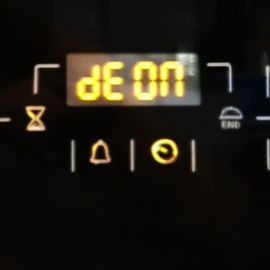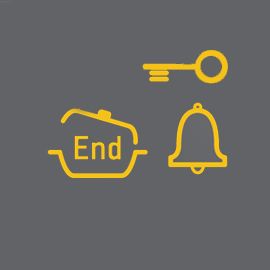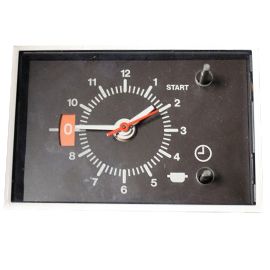Your Oven Is Suddenly Not Working
Will your oven no longer come on? Here we explain to you why your oven won't work. There are various different things that could be causing the problem you're experiencing.
THE POTENTIAL CAUSES FOR THIS FAULT:
-
There is an issue with the electricity supply to the appliance
-
The oven light is not working
-
Demonstration mode has been switched on
-
The child safety lock has been activated
-
The programmer has been set
-
The terminal block is not properly tightened
-
The door safety lock is damaged
-
The safety thermostat is defective
-
The programme selector is faulty
-
The main circuit board is faulty
WARNING
Before you do anything to your appliance, make sure you disconnect it from the power supply.
There is a risk of electric shock.
Wear suitable protective gloves if you need to dismantle anything.
There is a risk of getting cut or injured.
There is an issue with the electricity supply to the appliance
 Check there are no problems with your electricity meter or fusebox and make sure there is current reaching the cooker socket (using a multimeter for example). Also check that the socket hasn't melted due to electrical overheating. If you have any terminal connectors fitted, check they're properly tightened and that the electric wires are in good condition.
Check there are no problems with your electricity meter or fusebox and make sure there is current reaching the cooker socket (using a multimeter for example). Also check that the socket hasn't melted due to electrical overheating. If you have any terminal connectors fitted, check they're properly tightened and that the electric wires are in good condition.
The oven light is not working
 What appears to be a fault with the oven itself could simply be a failed oven light. We recommend you check the bulb and replace it if necessary.
What appears to be a fault with the oven itself could simply be a failed oven light. We recommend you check the bulb and replace it if necessary.
Demonstration mode has been switched on
 Demonstration mode was invented so that appliances could be put on display in stores. It's possible you've accidentally switched this mode on when cleaning your oven's control panel. If this turns out to be the case, check the user guide provided by the manufacturer to find out how to deactivate this mode.
Demonstration mode was invented so that appliances could be put on display in stores. It's possible you've accidentally switched this mode on when cleaning your oven's control panel. If this turns out to be the case, check the user guide provided by the manufacturer to find out how to deactivate this mode.
The child safety lock has been activated
 Most ovens these days are equipped with child safety locks. The child lock enables you to switch off the control panel and prevent the oven from being used. To use your oven as normal, all you need to do is simply turn off this safety feature on your appliance. The method used for doing this varies from oven to oven; so refer to your appliance's user manual.
Most ovens these days are equipped with child safety locks. The child lock enables you to switch off the control panel and prevent the oven from being used. To use your oven as normal, all you need to do is simply turn off this safety feature on your appliance. The method used for doing this varies from oven to oven; so refer to your appliance's user manual.
The programmer has been set
 Oven programmers, which can be either electronic or mechanical, allow you to set the time on the oven and programme it to come on at a particular time. If the time display is flashing, or if the programmer is set to delayed start, or is in the auto or "0" position, this could prevent the oven from coming on. Refer to your oven's user guide and check the section about setting the clock and timer.
Oven programmers, which can be either electronic or mechanical, allow you to set the time on the oven and programme it to come on at a particular time. If the time display is flashing, or if the programmer is set to delayed start, or is in the auto or "0" position, this could prevent the oven from coming on. Refer to your oven's user guide and check the section about setting the clock and timer.
The terminal block is not properly tightened
 The terminal block is located on the back of the oven and is where the mains cable connects. If it's not properly tightened or has melted at any of the connectors, your oven will not be able to operate. Where this is the case, the terminal block will need to be replaced.
The terminal block is located on the back of the oven and is where the mains cable connects. If it's not properly tightened or has melted at any of the connectors, your oven will not be able to operate. Where this is the case, the terminal block will need to be replaced.
The door safety lock is damaged
 The door safety lock ensures the door is kept securely closed when the oven is in pyrolysis mode. It also indicates whether the door is locked or not. If the lock's striker pin is bent, broken, out of position or not coming into contact with the door when it's closed, the appliance will not heat up. You can check the condition of the lock striker pin yourself. It will normally be located beneath the oven's main control panel.
The door safety lock ensures the door is kept securely closed when the oven is in pyrolysis mode. It also indicates whether the door is locked or not. If the lock's striker pin is bent, broken, out of position or not coming into contact with the door when it's closed, the appliance will not heat up. You can check the condition of the lock striker pin yourself. It will normally be located beneath the oven's main control panel.
The safety thermostat is defective
 The safety thermostat is a security device that prevents the oven from overheating. If it's in tripped mode, the oven will not heat up. Safety thermostats can sometimes be tripped/activated due to a faulty cooling fan or temperature sensor, or as a result of a fault on the thermostat itself. Some can be reset by pressing a button located on their top sides. The thermostat can also be checked and tested using a multimeter in ohmmeter mode. Simply place the meter's two probes on the thermostat's terminals. It should show continuity. If it doesn't, you will need to replace it.
The safety thermostat is a security device that prevents the oven from overheating. If it's in tripped mode, the oven will not heat up. Safety thermostats can sometimes be tripped/activated due to a faulty cooling fan or temperature sensor, or as a result of a fault on the thermostat itself. Some can be reset by pressing a button located on their top sides. The thermostat can also be checked and tested using a multimeter in ohmmeter mode. Simply place the meter's two probes on the thermostat's terminals. It should show continuity. If it doesn't, you will need to replace it.
Purchase an oven safety thermostat
The programme selector is faulty
 The commutator, or programme selector, enables power to be supplied to the heating elements. The electrical contacts on commutators can sometimes wear out, resulting in the current no longer getting through. The commutator will be located behind the programme selector dial. The fault will often be visible to the naked eye (one of the contacts is permanently "stuck" to the commutator). If it isn't, you can use a multimeter to check whether the contacts all have continuity when engaged.
The commutator, or programme selector, enables power to be supplied to the heating elements. The electrical contacts on commutators can sometimes wear out, resulting in the current no longer getting through. The commutator will be located behind the programme selector dial. The fault will often be visible to the naked eye (one of the contacts is permanently "stuck" to the commutator). If it isn't, you can use a multimeter to check whether the contacts all have continuity when engaged.
The main circuit board is faulty
 The circuit board (PCB) manages all your oven's functions (convection fan, heating elements, etc.). If everything else above has been checked and the PCB is definitely being supplied with 230 volts, the board itself may need replacing. You can either do this yourself or call on the services of a manufacturer-approved engineer.
The circuit board (PCB) manages all your oven's functions (convection fan, heating elements, etc.). If everything else above has been checked and the PCB is definitely being supplied with 230 volts, the board itself may need replacing. You can either do this yourself or call on the services of a manufacturer-approved engineer.
